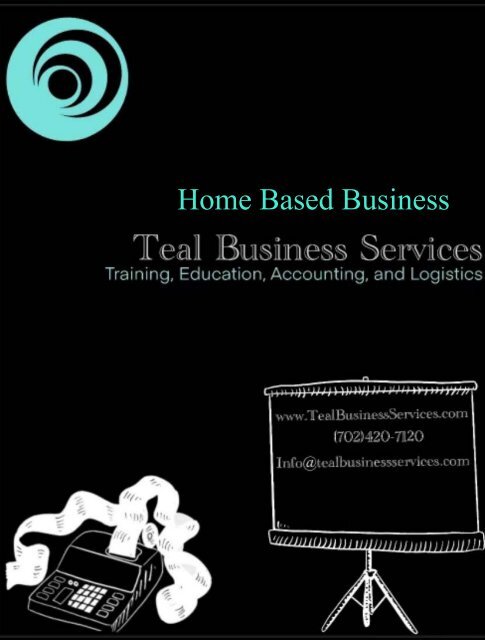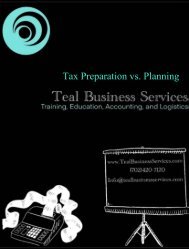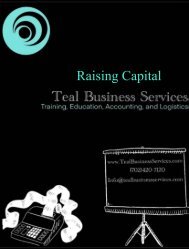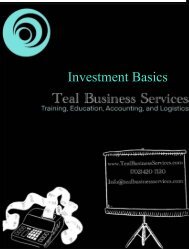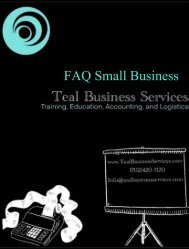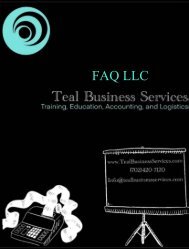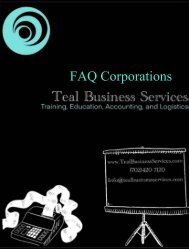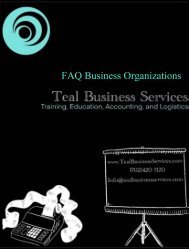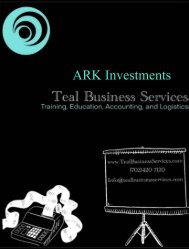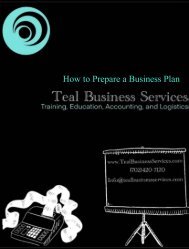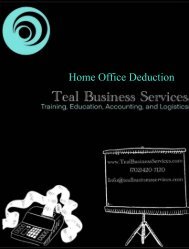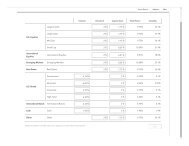Home based business
You also want an ePaper? Increase the reach of your titles
YUMPU automatically turns print PDFs into web optimized ePapers that Google loves.
<strong>Home</strong> Based Business
This Financial Guide reviews some of the special considerations of the home-<strong>based</strong><br />
<strong>business</strong>.<br />
Table of Contents<br />
• Is A <strong>Home</strong>-Based Business Right For You?<br />
• Compliance with Laws and Regulations<br />
• Planning Techniques<br />
More than 52 percent of <strong>business</strong>es today are home-<strong>based</strong>. Every day, people are<br />
striking out and achieving economic and creative independence by turning their skills<br />
into dollars. Garages, basements, and attics are being transformed into the corporate<br />
headquarters of the newest entrepreneurs - home-<strong>based</strong> <strong>business</strong>people.<br />
And, with technological advances in smartphones, tablets, and iPads as well as a rising<br />
demand for "service-oriented" <strong>business</strong>es, the opportunities seem to be endless.<br />
This Financial Guide discusses some of the basics you should consider in starting a<br />
home-<strong>based</strong> <strong>business</strong>. It does not attempt to cover all aspects of home-<strong>based</strong><br />
<strong>business</strong>es, but rather, addresses the general requirements of what's needed to start up<br />
a <strong>business</strong> in your home.<br />
Is a <strong>Home</strong>-Based Business Right for You?<br />
Choosing a home <strong>business</strong> is like choosing a spouse or partner: Think carefully before<br />
starting the <strong>business</strong>. Instead of plunging right in, take the time to learn as much about<br />
the market for any product or service as you can. Before you invest any time, effort, and<br />
money take a few moments to answer the following questions:<br />
• Can you describe in detail the <strong>business</strong> you plan on establishing?<br />
• What will be your product or service?<br />
• Is there a demand for your product or service?<br />
• Can you identify the target market for your product or service?<br />
• Do you have the talent and expertise needed to compete successfully?<br />
Before you dive head first into a home-<strong>based</strong> <strong>business</strong>, it's essential that you know why<br />
you are doing it and how you will do it. To succeed, your <strong>business</strong> must be <strong>based</strong> on<br />
something greater than a desire to be your own boss: an honest assessment of your<br />
own personality, and understanding of what's involved, and a lot of hard work. You have<br />
to be willing to plan ahead, and then make improvements and adjustments along the
oad. While there are no "best" or "right" reasons for starting a home-<strong>based</strong> <strong>business</strong>, it<br />
is vital to have a very clear idea of what you are getting into and why. Ask yourself these<br />
questions:<br />
• Are you a self-starter?<br />
• Can you stick to <strong>business</strong> if you're working at home?<br />
• Do you have the necessary self-discipline to maintain schedules?<br />
• Can you deal with the isolation of working from home?<br />
Working under the same roof that your family lives under may not prove to be as easy<br />
as it seems. It is important that you work in a professional environment; if at all possible,<br />
you should set up a separate office in your home. You must consider whether your<br />
home has enough space for a <strong>business</strong> and whether you can successfully run the<br />
<strong>business</strong> from your home.<br />
Compliance with Laws and Regulations<br />
A home-<strong>based</strong> <strong>business</strong> is subject to many of the same laws and regulations affecting<br />
other <strong>business</strong>es and you will be responsible for complying with them. There are some<br />
general areas to watch out for, but be sure to consult an attorney and your state<br />
department of labor to find out which laws and regulations will affect your <strong>business</strong>.<br />
Zoning<br />
Be aware of your city's zoning regulations. If your <strong>business</strong> operates in violation of them,<br />
you could be fined or closed down.<br />
Restrictions on Certain Goods<br />
Certain products may not be produced in the home. Most states outlaw home<br />
production of fireworks, drugs, poisons, sanitary or medical products, and toys. Some<br />
states also prohibit home-<strong>based</strong> <strong>business</strong>es from making food, drink, or clothing.<br />
Registration and Accounting Requirements<br />
You may need the following:<br />
• Work certificate or a license from the state (your <strong>business</strong>'s name may also need<br />
to be registered with the state)<br />
• Sales tax number<br />
• Separate <strong>business</strong> telephone
• Separate <strong>business</strong> bank account<br />
If your <strong>business</strong> has employees, you are responsible for withholding income, social<br />
security, and Medicare taxes, as well as complying with minimum wage and employee<br />
health and safety laws.<br />
Planning Techniques<br />
Money fuels all <strong>business</strong>es. With a little planning, you'll find that you can avoid most<br />
financial difficulties. When drawing up a financial plan, don't worry about using<br />
estimates. The process of thinking through these questions helps develop your <strong>business</strong><br />
skills and leads to solid financial planning.<br />
Related Guide: For guidance on setting up a <strong>business</strong> plan, please see the Financial<br />
Guide BUSINESS PLANS: How To Prepare An Effective One.<br />
Estimating Start-Up Costs<br />
To estimate your start-up costs, include all initial expenses such as fees, licenses,<br />
permits, telephone deposit, tools, office equipment and promotional expenses.<br />
Business experts say you should not expect a profit for the first eight to 10 months, so<br />
be sure to give yourself enough of a cushion if you need it.<br />
Projecting Operating Expenses<br />
Include salaries, utilities, office supplies, loan payments, taxes, legal services and<br />
insurance premiums, and don't forget to include your normal living expenses. Your<br />
<strong>business</strong> must not only meet its own needs but make sure it meets yours as well.<br />
Projecting Income<br />
It is essential that you know how to estimate your sales on a daily and monthly basis.<br />
From the sales estimates, you can develop projected income statements, break-even<br />
points, and cash-flow statements. Use your marketing research to estimate initial sales<br />
volume.<br />
Determining Cash Flow<br />
Working capital--not profits--pays your bills. Even though your assets may look great on<br />
the balance sheet, if your cash is tied up in receivables or equipment, your <strong>business</strong> is<br />
technically insolvent. In other words, you're broke.
Make a list of all anticipated expenses and projected income for each week and month.<br />
If you see a cash-flow crisis developing, cut back on everything but the necessities.<br />
Remember, preparation is the foundation of success. Learn how to strengthen your<br />
home-<strong>based</strong> <strong>business</strong>. Success doesn't just happen--you have to make it happen.<br />
****


